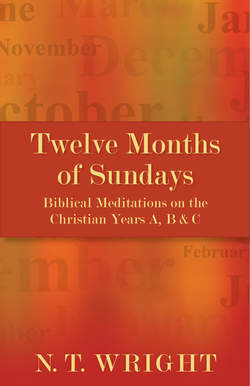Читать книгу Twelve Months of Sundays - N.T. Wright - Страница 48
На сайте Литреса книга снята с продажи.
ОглавлениеProper 7
Genesis 21.8–21
Romans 6.1b–11
Matthew 10.24–39
The prince of peace comes with a sword. To that theological oxymoron we must add the sad, and still tragic, story of Abraham, Hagar and Ishmael. Go down into the Genesis story, down the dark staircases of imagination, and even then you will perhaps never plumb the depths of Hagar’s misery, of Abraham’s dilemma, of Sarah’s memories, of Ishmael’s destiny. The next chapter, Isaac’s nightmare, belongs closely with this one, but that hardly constitutes an explanation. If God is to heal the world appropriately it must be through the obedient covenant people. But what if the covenant people are themselves disobedient? They themselves must share the pain of the healing process. The fact that it is also God’s pain does not make it easier.
Jesus’ challenge here is not that his followers should be anti-social for the sake of it, but that they should live out of a new identity, in comparison with which the normal Jewish identity, based tightly upon kinship, is to be set aside. Deep kinship loyalty is not normally our problem; where then are our deep loyalties, and how does this call of Jesus put us on the spot? Why did they call Jesus ‘Beelzebub’? Why don’t they call us that? We must ask, too, what we are most truly afraid of, and whether that squares with v. 28 – which I persist in taking to refer to Satan, not God (God can be trusted with the hairs of your head; he’s not out to get you).
Paul’s appeal in Romans 6 is likewise based on a new sense of identity. Underneath the whole argument of chapters 6—8 lies the Exodus narrative, emerging triumphantly into the daylight halfway through ch. 8 itself. As in 1 Corinthians 10, Paul sees the Christian life in the light of the wilderness wanderings of God’s people. They have left Egypt by coming through the waters of the Red Sea; in other words, they have left the territory of sin and death in their baptism into the Messiah. They will then come, not to Sinai to be given the law, but to the new Pentecost, the giving of the life-giving Spirit (7.1—8.11). That Spirit will be for them the pillar of cloud and of fire, leading them home to their promised inheritance, which turns out to be the entire redeemed creation (8.12–30).
Paul’s concern, therefore, is that in appreciating who they are in Christ his hearers should no longer regard themselves as ‘in Egypt’, constrained by the old order of sin and death. ‘Reckon yourselves to be dead to sin’, v. 11; this is not a matter of ‘if you make a big enough mental effort it’ll become true’, but ‘do the mathematics and you’ll see that this is who you are’. Like the children of Israel, we often hanker for the leeks and melons of Egypt. We need, instead, to be encouraged by the fruit brought fresh from the promised land.
